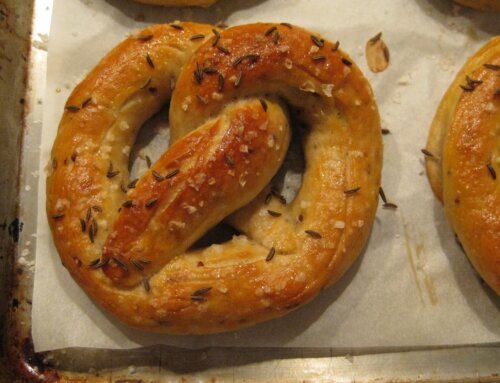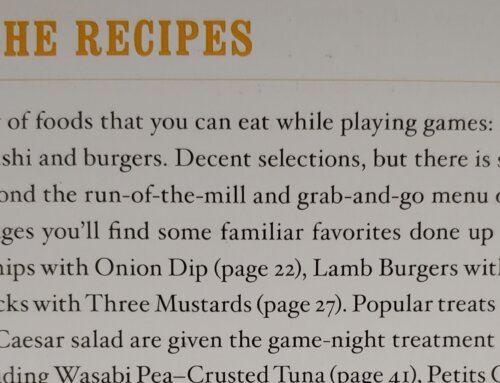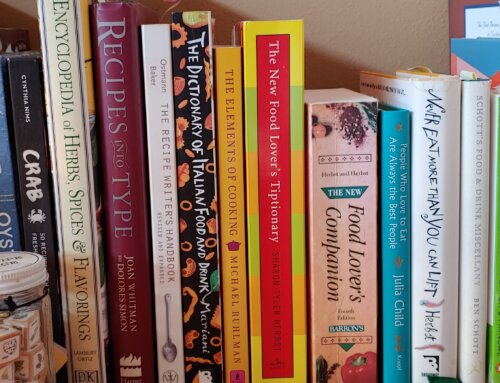There are more nuances to the choice of a recipe’s title than might be clear at first. Seems it should be pretty straight-forward, right? And often, it is. Salmon fillet, baked, served with a lime butter sauce….can be Baked Salmon with Lime Butter Sauce. Muffins made with cornmeal, embellished with cheddar cheese and roasted chiles? Cheddar and Roasted Chile Cornmeal Muffins. Pretty easy.
Descriptive, that’s a prime goal. Offer readers a quick idea of what the recipe’s got to offer. You have this brief moment of their glance at the title to snag their attention before they whip past to seek more inspiration elsewhere.
Provide enough detail, as in those couple simple examples, to let them know more than just the core component. Baked Salmon? Nice but kinda blah. Cornmeal Muffins? Surely tasty, but anything special about them? These and countless other relatively common ingredients and preparations have lots of recipe options out there. You want yours to sound enticing, interesting and worth the reader’s time to make. Not ho-hum.
I happened to listen a few days ago to an episode of Radio Cherry Bombe from last October, with guest Ina Garten talking about her new cookbook Modern Comfort Food. She brought up recipe titles, saying that she asks herself, of the recipes she’s working on, “will the title really just grab your attention?” She went on to say that “so many cookbooks have a recipe title that alludes to something but it doesn’t really tell you what it is. It’s ‘Aunt Somebody’s Chocolate Cake,’ well what about that chocolate cake is unique?” She wants people to see the title and say, “oh, that sounds really good!”
And here’s where the title can be a good test for us recipe writers. Not just the exercise of coming up with an ideal title, but reflecting on the recipe itself and what new/interesting/delicious it brings to the table. If you’re wracking your brain because you can’t think of anything more interesting for the recipe you just created than “Macaroni and Cheese” then maybe the recipe’s lacking some pizzazz to make it stand out from the crowd.
And geez, don’t undersell your recipe either!
Sure, grilled burgers are fantastic, who doesn’t love a good grilled burger? (With plenty of delicious meat-free options for vegetarians and vegans, of course.) But titling your recipe “Grilled Burgers” sounds more ho-hum than enticing and delectable. Even if your recipe is a relatively basic, classic, no-frills burger, offer it a bit of personality with an appropriate title. Backyard Grilled Burgers. Old-School Grilled Burgers. Simply Perfect Grilled Burgers.
One such example of underselling the recipe I saw recently on a bag of sugar I’d just picked up at the store. Which is also an example of context being another important factor to keep in mind—as it is in other aspects of recipe writing, writing in general and, well, life. The recipe is Basic Chocolate Chip Cookies. Now, don’t get me wrong. “Basic” in and of itself is often an ideal descriptor. “The basics” are valuable, foundational elements in many cases, including in a couple of earlier posts about recipe writing. But in a recipe title, “basic” echoes in my ear with “not very interesting.”
To Ina’s point made earlier, what about these chocolate chip cookies is worth the time and energy going into them? Of all recipes, that’s one we have a plethora of options to choose from. If the cookies are crisp, rich, spiced, nutty or any such character element, it’s ideal to call out in the title. Or even just honor their simplicity with “Classic” or “Timeless”—which does serve to tell the reader what to expect. Ironically, the sugar brand is Essential Everyday, so I’d have ventured to suggest “Essential Chocolate Chop Cookies” would be better. Playfully urgent….these are essential cookies and you must drop everything to make them.
As for context, I can definitely see occasions when “Basic [fill in the blank]” is an ideal recipe title. A book that presents standard, building-block recipes and techniques? For sure. Basic Vinaigrette. Basic Scrambled Eggs. But that gets repetitive after a few recipes. A recipe that’s a simple but delicious starting point for other variations? You bet. Basil Grilled Burgers covering elemental steps of making a great burger, followed by Grilled Burgers with Balsamic Grilled Onion, Mediterranean Lamb Burgers with Olive Relish, Cheddar-Stuffed Grilled Burgers to riff on that? That’s great.
For recipe titles that are most likely to draw in the reader, be descriptive and enticing. Neither too simplicist, as just discussed. Nor going overboard with listing of more than a few ingredients. Don’t use vague references that don’t mean anything to the reader. In a handful of words, hit the highlights of what’s especially interesting and delicious about the recipe. Leave them saying, “oh, that sounds really good!”




